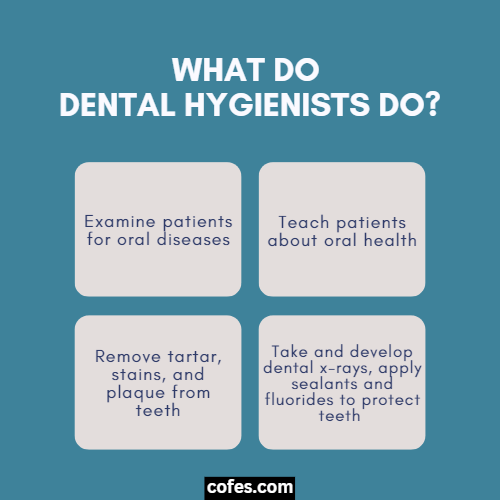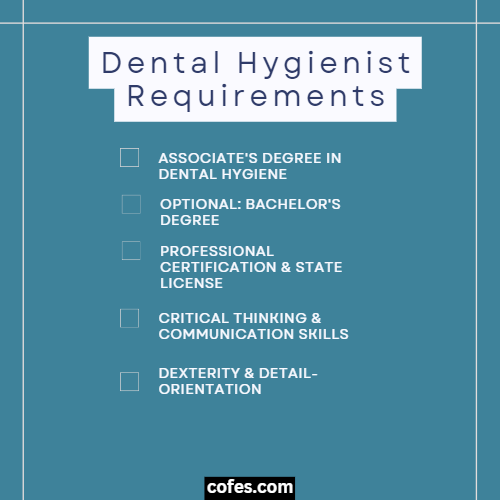Dental hygienists are critical members of any dental office’s team.
Do dental hygienists and dentists land on the same track?
Well, they are rather different.
Dentists perform oral surgery on the patients, while hygienists maintain hygiene and assist the dentist before and after surgery.
These two clauses sound similar but need separate attention.
Dental hygienist responsibilities include cleaning plaque, clearing out debris from the tooth, guiding the patient before and after the oral surgery, etc.
Dental Hygienist Information
| Official Job Title | Dental Hygienist |
| Average Salary | $55,303 |
| Stress Level | Low |
| Work / Life | High |
| Job Satisfaction | Average |
| Career Advancement | Average |
Dental Hygienist Job Description
Many dentists offer flexibility in hours, work versatility, and long-term learning in this career as soon as the learners graduate from the university.
Dental hygienists offer critical help to patients in need of oral health assessments.
They help prevent and treat oral diseases and conditions.
What Is A Dental Hygienist?
A dental hygienist helps in preventing and managing oral health.
As the name suggests, they are hygienist who takes care of the oral without performing surgery.
What Does A Dental Hygienist Do Daily?
Their responsibilities change per day.
It depends on the type of patient that comes their way.
These dental professionals start by carrying out an oral examination and getting the dental history of the patient.
Then, the dental hygienist processes and interprets dental x-rays.
According to US News, it is the second-best profession in terms of growth.

Responsibilities, Duties & Roles Of A Dental Hygienist
The primary responsibilities include conducting a complete analysis of the gums and teeth.
Alongside making reports and updating the patient’s history, they are also responsible for interpreting dental x-rays.
The dental hygienist’s primary duty is to remove plaque, debris, and stain from the teeth.
With the application of cavity-preventive agents, they administer antimicrobial agents.
Their significant role is that of a root-planning performer, temporary fillings, and maintaining long-term diagnostic reports.
Dental Hygienist Salary
Typically, a dental hygienist works as a freelancer.
The full-time job pays less on average as compared to an experienced individual who works in different clinics.
Here is the average know-how about a dental hygienist’s salary.
Average Salary
The average salary per hour is $77,810.
But it depends on the region, geographic location, and availability of the hygienist.
Starting Salary
The average starting salary is $58,552 per year.
Senior Salary
The senior salary of a dental hygienist can go as high as $80,249 per year.
They can make six figures and have professional advancement alongside government incentives.
How To Become A Dental Hygienist
Most of the time, the advancements in the career are led by education and practical experience.
A dental hygienist has a promising career in some states of the United States.
The Entry Level: Certification, Training & Degree
Most commonly, the accepted level of certification is an associate’s degree in dental hygiene.
Some clinics are hesitant towards bachelor’s and master’s degree acceptance.
There are academic programs available for enhancing dental hygienists’ skills.
Other Skill Sets, Requirements & Qualifications
License is a compulsion, and so is accreditation.
One of the significant requirements is graduation from Commission on Dental Education-accredited dental hygiene education programs.
It makes them eligible for practical application.
How Long Does It Take To Become A Dental Hygienist?
It takes two to six years of professional education and general accreditation.
Once dental hygienists have enough hands-on experience and licenses, they can apply for skilled jobs.
Is It Hard To Become A Dental Hygienist?
Just like other healthcare professions, dental hygiene also requires a high level of commitment.
The applicant needs to study the whole facial anatomy and pass professional exams held at the end of every year.
Dental Hygienist Career Paths
Many dental hygienists come from highly accredited schools and have certifications.
There are many factors to consider before embarking on the career path of a dental hygienist.
The Dental Hygienist Roadmap
After completing the dental hygienist associate’s degree, the applicant must attain a license.
All states require dental hygienists to have a state license, and requirements may vary depending on the state.
Once allowed the practical application, they can start as a junior hygienist.

Projections For Growth In Dental Hygienist Jobs
The U.S. Bureau of Labor Statistics projects that this profession will have a 9% growth through 2031, which is faster than average.
In Summary: Is Dental Hygienist A Good Career?
Some researchers confirm the advancement in dental hygiene in the upcoming years.
It can be promising as long as there are significant differences in before and after-surgery results.
Working Conditions
Working conditions are similar to doctors and health professionals.
The clinic is clean, hygienic, and pleasant, but dental hygienists require physical attention and practical application.
Can A Dental Hygienist Work Remotely From Home?
There are non-clinical positions available for dental hygienists.
They can work as dental instructors, provide work, and assignments, teach practical applications, etc.
Many organizations hire dental hygienists with experience for virtual roles.
How Many Hours Does A Dental Hygienist Work?
On average, a dental hygienist works 20 hours per week.
It takes three to four hours per day, excluding Sundays.
Can A Dental Hygienist Work Part-Time?
Some dental hygienists work as freelancers.
They aren’t committed to one institute or clinic but are called upon a patient’s request.
What Are The Average Vacation Days Of A Dental Hygienist?
Only 31 percent of dental hygienists get paid leave of 14 days.
However, 28 percent complained about getting no sick leaves.
Alternative Careers & Similar Jobs to a Dental Hygienist
- Medical Laboratory Technician
- Physical Therapy Assistant
- Medical Records Technician
- Phlebotomist
- Medical Transcriptionist
- Medical And Health Service Manager
- Veterinary Assistant
- Mental Health Counselor
- Pharmacy Assistant
- Research Assistant
Dental Hygienist Resume Tips
Start with making your title stand out.
Be thorough, sound confident, and focus on your services and values.
Share your mission and vision.
Make it easy to read and well-organized.
Keep a professional, minimal design.
Dental Hygienist Interview Questions
For this particular job, the applicant is not only going to handle the history updating of the patient.
They must have abilities to treat emergencies in case of a dentist’s absence.
Here are a few interview questions for dental hygienists.
Q1: What do you think about our working hours?
Why it works: Tells about their convenience working at general hours. It also shows their prolonged commitment.
Q2: Describe your personality in less than 10 seconds
Why it works: Some dental hygienists are shy and become underconfident. In this practical field, confidence is the top forte.
Q3: How long did you work, and why did you leave that job?
Why it works: Most typical reasons for leaving jobs are underpayment and asking for over-commitment.
This question helps define the logic in a more professional approach.
Q4: Ask them about their weaknesses.
Why it works: Understanding a candidate’s weaknesses helps you figure out the situations the applicant might not be suitable for.
Jobs Related To a Dental Hygienist
- Dentist
- Registered dental hygienist
- Dental office receptionist
- Dental assistant
For HR Managers: Tips For Hiring A Dental Hygienist
Senior hygienists and dentists tend to grow their clinical teams by hiring dental hygienists.
But there are requirements to understand before adding the hygienist to the team.
Here are the key characteristics you should look for in your dental hygienist.
Key Characteristics To Look For In A Dental Hygienist
- Look at their excitement while appearing for the interview.
- Listen to their reaction when it comes to volunteer opportunities.
- Ask them about local experiences they’ve had in university or at a clinic.
- Let them define themselves in three words.
Minimum Level Of Education & Experience
The minimum level of education is essential when it comes to hiring for a full-time job.
It can be any programs they applied to and completed university education (bachelor or master) or local dental schools.
References
- https://blog.clouddentistry.com/working-as-a-dental-hygienist-usa
- https://money.usnews.com/careers/best-jobs/rankings/best-health-care-support-jobs
- https://explorehealthcareers.org/career/dentistry/dental-hygienist/
- https://www.fortis.edu/blog/healthcare/day-to-day-responsibilities-of-dental-hygienists.html
- https://www.zensupplies.com/zenone-podcast/tips-for-hiring/
- https://www.indeed.com/recruitment/how-to-hire/dental-hygienist
